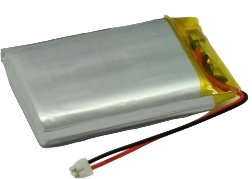
Introduction to Lithium Polymer Battery Advantages
Lithium polymer battery advantages have made this technology a preferred power source for many portable electronics, wearables, and smart devices. Unlike traditional lithium-ion batteries, lithium polymer batteries use a gel-like polymer electrolyte, which offers unique benefits in safety, design, and performance.
Top 7 Advantages of Lithium Polymer Batteries
- No Leakage Issues
Lithium polymer batteries do not contain liquid electrolytes, instead using a solid or gel-like polymer, which greatly reduces the risk of electrolyte leakage and improves safety. - Ultra-Thin Design
For example, a 3.6V 400mAh lithium polymer battery can be as thin as 0.5mm, enabling extremely slim device designs. - Flexible Shapes
Their flexible construction allows lithium polymer batteries to be manufactured in various shapes and sizes to fit diverse device layouts. - Bendable and Flexible
These batteries can bend up to about 90 degrees without damage, making them ideal for wearable technology and flexible electronics. - High Voltage from a Single Cell
Unlike liquid electrolyte batteries that require multiple cells in series for high voltage, lithium polymer batteries can achieve high voltages through internal multilayer stacking in a single cell. - Higher Capacity Compared to Same Size Lithium-Ion Batteries
They offer approximately double the capacity of traditional lithium-ion batteries of the same volume. - Enhanced Safety and Environmental Friendliness
The absence of liquid electrolytes reduces fire hazards and environmental impact.
What Is a Smart Secondary Battery?
A smart secondary battery includes a built-in chip that not only powers devices but also manages battery functions like displaying remaining capacity, tracking charge cycles, and monitoring temperature. Although smart batteries are not yet widely available on the market, they are expected to dominate future portable electronics such as:
- Portable cameras
- Cordless phones
- Mobile phones
- Laptops
Smart batteries improve device reliability and user experience through intelligent power management.
Types of Button Cells and Their Applications
Button cells are small, compact batteries commonly used in various electronic devices. Below are common types and their typical uses:
| Button Cell Type | Characteristics | Typical Devices |
|---|---|---|
| Silver Oxide Battery | High and stable voltage; ~5% annual self-discharge | Watches, cameras, calculators |
| Alkaline Manganese | Voltage decreases over time; ~3% annual self-discharge | Electronics, calculators, budget watches |
| Lithium Manganese | Low self-discharge (~1% per year) | Low-drain devices, calculators, watches, remote controls |
| Zinc-Air | High capacity; ~3% annual self-discharge if inactive | Hearing aids, cameras, paging devices |
| Zinc Mercury | Emerging technology; ~2% annual self-discharge but environmental concerns | Hearing aids, cameras, watches |
Future Trends and Applications of Lithium Polymer Batteries
Thanks to their lithium polymer battery advantages, these batteries are increasingly adopted in wearable devices, drones, flexible displays, and electric vehicles. Innovations continue to improve their energy density, charging speed, and lifespan, positioning them as the cornerstone of next-generation portable power solutions.
Conclusion
Understanding the lithium polymer battery advantages helps consumers and manufacturers choose the right battery technology for safer, slimmer, and more efficient electronic devices. Coupled with advancements in smart battery technology and specialized button cells, lithium polymer batteries will continue to drive innovation in the electronics industry.
For more details or custom solutions, please visit our About Us pagehttps://hrlibattery.com/about-us/ or Contact Ushttps://hrlibattery.com/contact-us
For the latest market trends and industry insights, MarketWatch offers comprehensive reports on lithium polymer battery market growth: https://www.marketwatch.com/press-release/lithium-polymer-battery-market-size-share-analysis-2025-2029-2023-03-15
